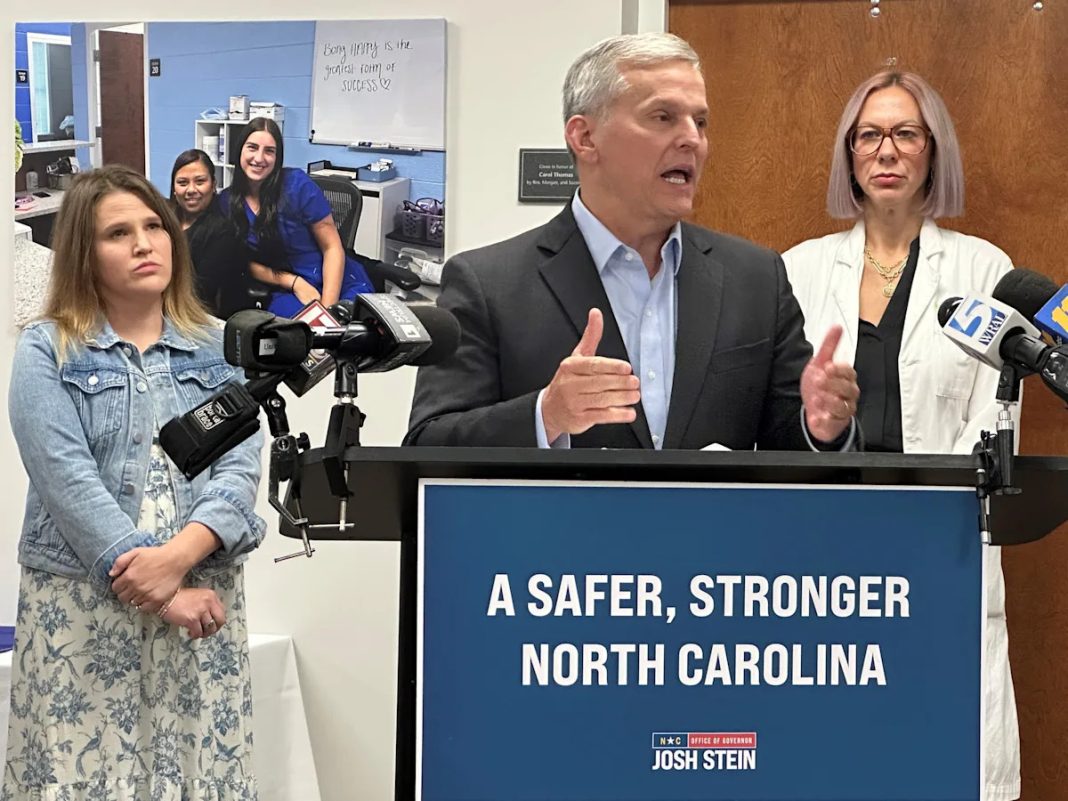RALEIGH, N.C. (AP) — North Carolina Medicaid patients face a threat of reduced access to services — before separate changes approved within President Donald Trump’s spending-reduction law are implemented — as an impasse over state Medicaid funding extends further.
Democratic Gov. Josh Stein, whose administration oversees Medicaid for 3.1 million people in the ninth-largest state, confirmed Thursday that starting next week the state program will lower reimbursement rates for doctors, hospitals and other medical providers.
Stein said it wasn’t too late for the Republican-controlled legislature to solve the problem, adding that the rate cuts can be reversed. If no solution can be found soon, many doctors may decide to leave the Medicaid program, leaving Medicaid enrollees in precarious positions, a physician said at the news conference.
“This will lead to longer wait times, delayed diagnoses and worse health outcomes for the patients of our state, especially for those who live in rural communities and who are already marginalized and underserved,” Dr. Jenna Beckham said at a health care clinic in Raleigh.
Stein’s administration has said for several weeks that additional Medicaid funds approved by the General Assembly this summer were still $319 million short of addressing population changes and rising health care costs, and without a fix rate reductions would take effect Oct. 1. GOP lawmakers couldn’t agree on a way forward this week as the two chambers failed to agree about spending on two health care projects.
With the legislature next scheduled to meet Oct. 20, Stein said the state Medicaid agency couldn’t delay further to avoid deeper future reductions, and he blamed lawmakers in the process. The broad reductions range from 3% for home health and ambulance services to 10% for hospitals, nursing homes and hospice care.
“They put their political dispute ahead of our people’s health,” Stein said at Alliance Medical Ministry. “Their disagreements have nothing to do with Medicaid. It’s hard for me to express the gravity of their failure.”
Republican lawmakers said such unilateral action by Stein was unprecedented so early in the fiscal year, and insist the rate cuts — which could prompt some providers to reduce services or stop seeing Medicaid enrollees — aren’t needed.
“The governor has decided with very little notice to threaten not us but the North Carolina residents needing health care with massive cuts that will begin months before they have to,” GOP Rep. Grant Campbell of Cabarrus County, a physician, said on the House floor this week.
Stein and Jay Ludlum, a deputy health secretary who leads North Carolina Medicaid, said Thursday that unlike recent years no additional federal funds are anticipated to close the shortfall.
House and Senate Republicans this week offered and passed competing bills that increased Medicaid funding another $190 million annually — an amount that Stein said the agency could accept until early 2026. But legislators left Raleigh without a final measure, deepening animosity while a state government budget is also three months late.
The Senate bill included language that also directed $208.5 million in previously received federal money be allocated to help build a standalone children’s hospital in Wake County by two university medical schools and for rural health investments. The House version left them out.
Senate Republicans said they and House counterparts had agreed in 2023 to authorize funding for the hospital and rural health initiatives, and project leaders are counting on what is now a third portion of funds, Senate Majority Leader Michael Lee told colleagues. But House Republicans now have second thoughts about both projects and said they should be discussed within broader budget negotiations.
House Speaker Destin Hall said there are already several children’s hospitals in the state and some colleagues have asked, “Why would we give hundreds of millions of dollars to a new hospital in Wake County that’s doing pretty good economically?” Senate leader Phil Berger said the House is to blame for threatening Medicaid services because they aren’t sticking to its previous decisions on the hospital and rural health care projects.
Stein and his Democratic allies have said Trump’s spending-cut law he signed in July threatens Medicaid enrollment for hundreds of thousands of residents and the health of rural hospitals. While Republican lawmakers have downplayed the threat, diminishing funds from Washington have placed them in a more cautious fiscal posture.

